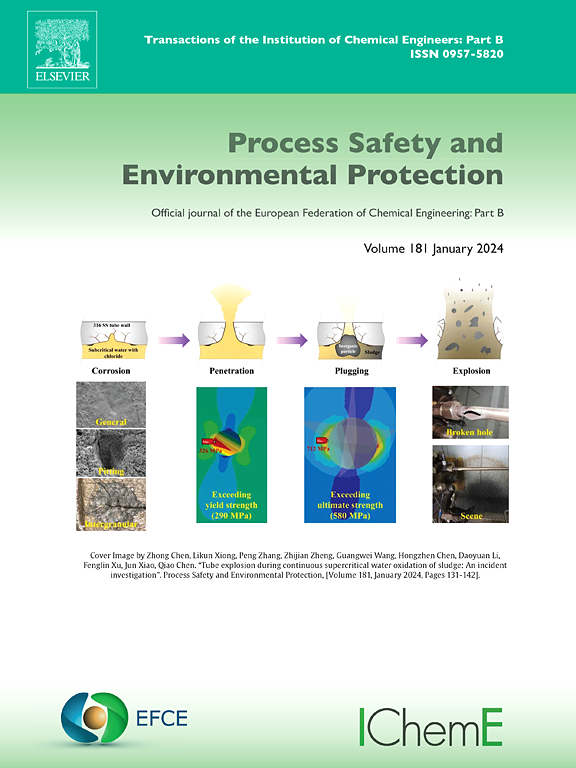在启动过程中避免费托合成失控:温度和压力的影响
IF 7.8
2区 环境科学与生态学
Q1 ENGINEERING, CHEMICAL
引用次数: 0
摘要
费托合成(FTS)中试工厂的运行对于推进Power-to-X战略至关重要。然而,由于该系统对热不稳定性的明显敏感性,与多家初创公司进行实验活动带来了重大挑战,并且在文献中仍然是一个未解决的挑战。本实验研究分析了一个中试FTS反应堆在可控加热和加压条件下的热响应,旨在确定安全运行极限,防止热失控。在本实验中,当加热速率响应(HRR)超过15 ºC/h时,会出现失控现象,而将油加热限制在1 ºC/h时,可以实现稳定运行。以3 bar/h的速度从10到20 bar加压,可显著降低热速率,为0.48 ºC/bar,为210 ºC以下的热陡增提供了替代方案。这些发现强调了将温度和压力斜坡策略结合起来以保持启动期间的热控制的重要性,并强调了持续评估加热速率响应并将其保持在临界阈值以下以确保安全稳定运行的必要性。本文章由计算机程序翻译,如有差异,请以英文原文为准。
Avoiding runaway scenarios in Fischer-Tropsch synthesis during startup: temperature and pressure influence
The operation of Fischer-Tropsch synthesis (FTS) pilot plants is essential to advancing Power-to-X strategies. However, conducting experimental campaigns with multiple startups introduces significant challenges due to the system's pronounced sensitivity to thermal instability and remains an unaddressed challenge in the literature. This experimental study analyzes the thermal response of a pilot-scale FTS reactor under controlled heating and pressurization, aiming to identify safe operating limits to prevent thermal runaway. In this experimental work, runaway was observed when the heating rate response (HRR) exceeded 15 ºC/h, while stable operation was achieved by limiting oil heating to <1 ºC/h. Pressurization from 10 to 20 bar at 3 bar/h induced a significantly lower thermal rate of 0.48 ºC/bar, offering an alternative to thermal ramping below 210 ºC. These findings highlight the importance of combining temperature and pressure ramping strategies to maintain thermal control during startup and underscore the need to evaluate the heating rate response continuously and maintain it below the critical threshold to ensure safe and stable operation.
求助全文
通过发布文献求助,成功后即可免费获取论文全文。
去求助
来源期刊

Process Safety and Environmental Protection
环境科学-工程:化工
CiteScore
11.40
自引率
15.40%
发文量
929
审稿时长
8.0 months
期刊介绍:
The Process Safety and Environmental Protection (PSEP) journal is a leading international publication that focuses on the publication of high-quality, original research papers in the field of engineering, specifically those related to the safety of industrial processes and environmental protection. The journal encourages submissions that present new developments in safety and environmental aspects, particularly those that show how research findings can be applied in process engineering design and practice.
PSEP is particularly interested in research that brings fresh perspectives to established engineering principles, identifies unsolved problems, or suggests directions for future research. The journal also values contributions that push the boundaries of traditional engineering and welcomes multidisciplinary papers.
PSEP's articles are abstracted and indexed by a range of databases and services, which helps to ensure that the journal's research is accessible and recognized in the academic and professional communities. These databases include ANTE, Chemical Abstracts, Chemical Hazards in Industry, Current Contents, Elsevier Engineering Information database, Pascal Francis, Web of Science, Scopus, Engineering Information Database EnCompass LIT (Elsevier), and INSPEC. This wide coverage facilitates the dissemination of the journal's content to a global audience interested in process safety and environmental engineering.
 求助内容:
求助内容: 应助结果提醒方式:
应助结果提醒方式:


